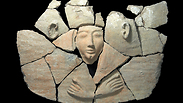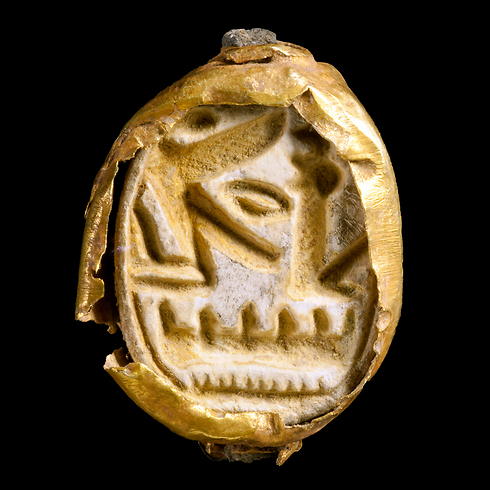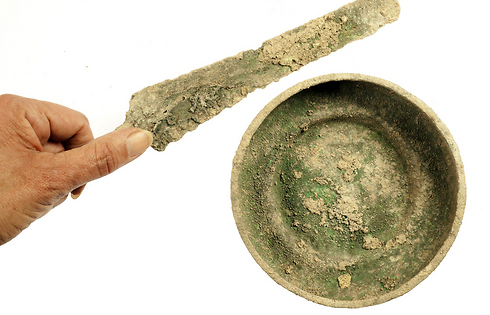
3,300-year-old Egyptian coffin discovered in northern Israel
Skeleton of man believed to be either Canaanite or Egyptian discovered in coffin together with gold scarab, pottery, additional rare artifacts, testifying to rich regional culture.
A 3,300-year-old skeleton and artifacts belonging to an Egyptian clerk were discovered in an ancient coffin in northern Israel Wednesday, along with a ring with the name of an Egyptian pharaoh engraved into it.
Israel Antiquities Authority inspectors recently discovered the 3,300-year-old sarcophagus of a clerk which they believe was part of the Egyptian army. The coffin contained a skeleton and various artifacts, including a gold scarab seal marked with the name of the Egyptian Pharaoh Seti I.
The historical pieces were found between Kibbutz Sarid and Ramat Gabriel as part of work on Israel's natural gas transportation infrastructure.
Related stories:
During the excavation, a part of an ancient burial was revealed from the Late Bronze Age at the foot of Tel Shadud near Kibbutz Sarid. The skeleton of a grown man was found inside the internal part of the coffin together with pottery pieces, a bronze dagger, a bowl and pieces of hammered bronze.
The excavated graves of two men and two women were also discovered near the coffin. The discovery of the coffin indicates Egypt's control of Jezreel Valley area in the Late Bronze Age (13th century BC). During the reign of the Pharaohs in Israel, Egyptian culture had prominent influence on the Canaanite elite and the recent find is an important sign of that influence.
Dr. Edwin Van Dan Brink, Dan Kirzner and Dr. Ron Be'eri - IAA excavation directors, said that "because the tools that were buried together with the deceased were of local production, we assume that the deceased was of Canaanite origin who worked under Egyptian rule."

Another possibility is that the coffin belonged to a wealthy man who imitated the Egyptian burial customs. An ordinary person couldn't have afforded such a coffin. It is obvious the deceased was a member of the local elite.
The rare Egyptian scarab also found on the scene was used to seal documents, and bears the name of Pharoah Seti I, who was the father of Ramses II, identified by some scholars as the pharaoh from the Torah's account of the Exodus from Egypt.
The excavation at the site in question have ended and the findings were transferred to the Israel Antiquities Authority in Jerusalem, which is considering sampling DNA from inside the coffin to see determine if the deceased was originally a Canaanite, or an Egyptian buried in Canaan.











